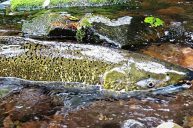It turns out that fish may be getting addicted to drugs, and we're all to blame. Researchers have been studying how pharmaceutical and also illegal drug pollution is affecting the sealife population. For one, some brown trout became addicted to meth. Another type of fish lost its fear of predators after ingesting depression medication.
It sounds like a bad science fiction movie. But fish aregetting hooked on drugs is a worrisome sign that could have a devastating effect. For instance, female starlings that ingest antidepressants are less likely to attract male birds. Contraceptive pills have caused complete sex reversals in some fish species causing to a decline and also increased extinction events. Researchers blame modern pharmaceutical waste as a major issue for sealife.
Michael Bertram, an assistant professor at the Swedish University of Agricultural Sciences, said, "Active pharmaceutical ingredients are found in waterways all around the globe, including in organisms that we might eat." It's been a problem for decades, but it's getting worse.
In a paper published on Wednesday in the journal Nature Sustainability, researchers urged the pharmacy industry to make changes.
Researchers Find Drugs In Waterways
"There are a few pathways for these chemicals to enter the environment," Bertram, one of the paper's authors, said. "If there is inadequate treatment of pharmaceuticals that are being released during drug production, that's one way. Another is during use. When a human takes a pill, not all of that drug is broken down inside our bodies and so through our excrement, the effluent is released directly into the environment."
In addition to medication, illegal drugs such as cocaine and meth in the waterways are affecting the fish population. A recent study tested 1,052 locations for 61 drugs. Nearly half showed traces of at least one drug above safe levels.
"Appreciating that patient access to pharmaceuticals will remain vital into the future, we urge drug designers and manufacturers, scientists and policymakers to recognise the growing environmental threat posed by APIs and to urgently prioritise the sustainable molecular design of greener drugs to prevent further environmental harm," the paper said.
"Greener drugs reduce the potential for pollution throughout the entire cycle," said Gorka Orive, a scientist and professor of pharmacy based at the University of the Basque Country, and an author of the study. "Drugs must be designed to not only be effective and safe, but also to have a reduced potential risk to wildlife and human health when present in the environment."




